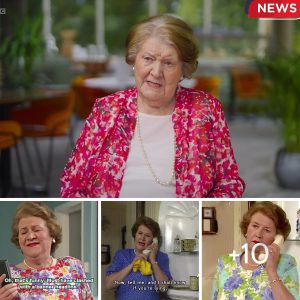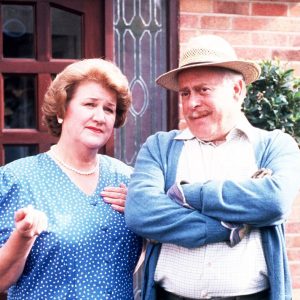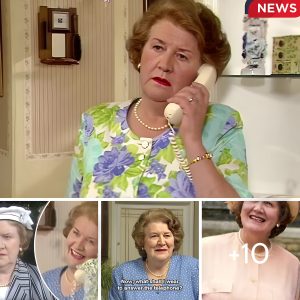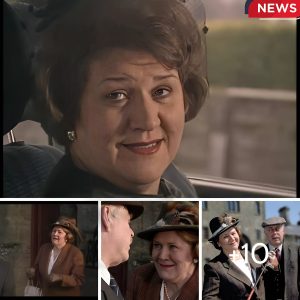‘Keeping Up Appearances’ and the Enduring Power of Pretension: The Legacy of Hyacinth Bucket and Britain’s Most Lovable Social Climber
In the pantheon of British sitcoms, few characters have etched themselves into popular culture quite like Hyacinth Bucket — or as she adamantly insists, “Bouquet.” To call someone “a Hyacinth Bucket” today is to instantly evoke the image of a tireless social climber: eccentric, overly genteel, and obsessively pretentious. The power of Keeping Up Appearances, the sitcom that birthed this indelible archetype, lies in its ability to lampoon British class anxiety while striking a universal chord that resonates from suburban England to the far reaches of global syndication.
A Woman on a Mission: Climbing the Ladder in Pearls
Airing on BBC One from 1990 to 1995, Keeping Up Appearances became a cultural phenomenon thanks in large part to the sublime performance of Dame Patricia Routledge. As Hyacinth, Routledge created a woman so obliviously committed to her imagined social status that every episode unfolds like a masterclass in farce. Her motto might as well be: “Fake it till you make it… or at least until the vicar hides in a bush to avoid you.”
Each week, viewers watched as Hyacinth dragged her weary husband Richard (played with dry brilliance by Clive Swift) on yet another quest to impress the upper crust. Whether she’s planning a “candlelight supper” or loitering in stately homes hoping to bump into minor aristocracy, Hyacinth’s world is defined by illusion, etiquette, and the ever-present dread of being outed as middle class.
“If there’s one thing I can’t stand,” she once declared with deadly seriousness, “it’s snobbery and one-upmanship. Makes it so much harder for those of us who actually are superior.”
Domestic Disasters and the Theatre of Class
Much of the show’s comedy emerges from the contrast between Hyacinth’s aspirations and her inescapable reality. Her modest suburban bungalow, her white slimline telephone, her prized “Royal Doulton with the hand-painted periwinkles” — all are symbols in a desperate theatre of upward mobility. Yet for all her grandeur, Hyacinth is surrounded by reminders of her roots.
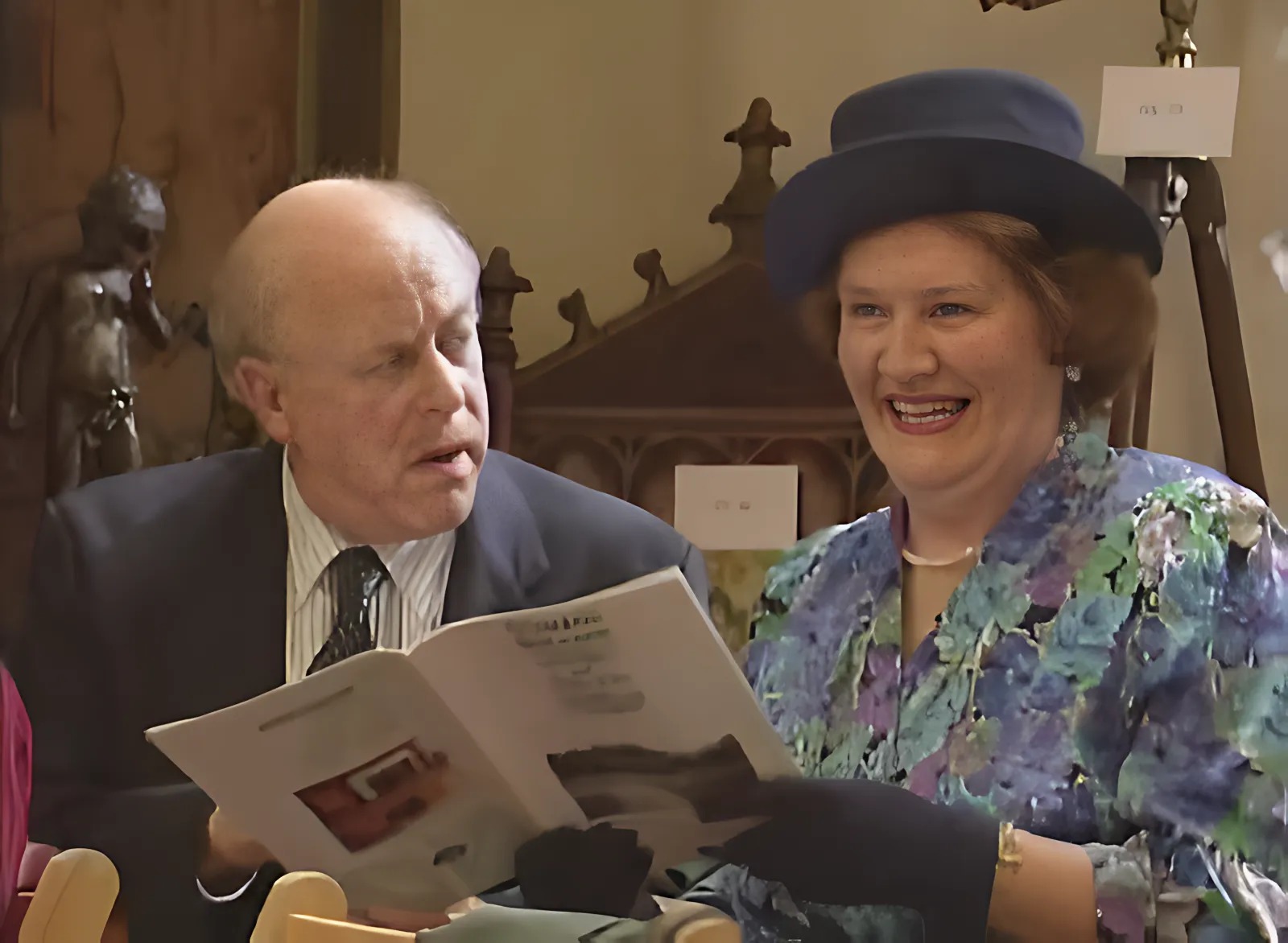
Take her next-door neighbor Elizabeth (Josephine Tewson), a polite and gentle woman who becomes a jittery mess the moment she steps into Hyacinth’s home. One of the show’s longest-running gags sees Elizabeth nervously smashing fine china, afraid of offending her overbearing hostess. Her brother Emmet (David Griffin), a reserved amateur musician, fares little better; his arrival in Series 2 subjects him to Hyacinth’s warbling soprano, performed unsolicited in hopes of landing a lead role in one of his productions.
Even the local vicar, the very emblem of calm and compassion, refers to her behind closed doors as “the Bucket woman,” dreading her offers to “help” at church events.
The Family She Tries to Forget
Perhaps the show’s most biting comedy comes from Hyacinth’s efforts to distance herself from her scandalously working-class relatives. Her sisters Daisy and Rose, along with Daisy’s beer-swilling husband Onslow and their senile father, live in a shabby council estate that is worlds apart from Hyacinth’s manicured street. Their behavior — Rose’s romantic escapades, Onslow’s lounging in a grease-stained vest — is a constant source of humiliation to Hyacinth, who will do anything to prevent their existence from being discovered by her genteel acquaintances.
“Richard, you know I love my family,” she says, eyes darting, “but that’s no reason why I should have to acknowledge them in broad daylight.”
The irony, of course, is that her “lower-class” family members often connect better with Hyacinth’s guests than she does. The people she seeks to impress are frequently charmed by the warmth and authenticity of Daisy or Onslow, while recoiling from Hyacinth’s forced airs.
Meanwhile, her beloved son Sheridan — unseen but frequently referenced — only calls to ask for money. Hyacinth sees these calls as evidence of their deep bond, though Richard and the audience recognize them as anything but.
Crafting a Comic Icon
Hyacinth Bucket may have been created by legendary sitcom writer Roy Clarke (of Last of the Summer Wine fame), but it was the vision of director Harold Snoad and the extraordinary talents of Patricia Routledge that truly brought her to life. Though Routledge was an accomplished stage actress with little sitcom experience, her razor-sharp comedic instincts, both verbal and physical, transformed the role into something iconic.
Every performance is a symphony of social anxiety. From her sing-song phone greeting — “The Bouquet residence, the lady of the house speaking” — to the spectacular sight gags (falling into bushes, scaling garden walls), Routledge played Hyacinth with unshakable conviction. She didn’t wink at the audience; she was Hyacinth. That level of immersion is why it’s now nearly impossible to imagine anyone else in the role.
The supporting cast was equally well-matched. Clive Swift infused Richard with both resignation and affection, revealing a quiet love that made their marriage believable amid the absurdity. Judy Cornwell (Daisy), Geoffrey Hughes (Onslow), and Mary Millar (Rose, from Series 2 onward) brought boisterous energy and perfectly balanced Routledge’s rigidity. Even minor characters like the vicar’s wife or the postman were richly drawn and hilariously exasperated by Hyacinth’s antics.
A Legacy Beyond Laughs
Though it ended in 1995 after five seasons, Keeping Up Appearances has never truly left the airwaves. The show remains one of the BBC’s most successful exports, beloved in the U.S., Australia, Scandinavia, and beyond. The single-episode prequel Young Hyacinth (2016) offered a brief return, tracing the character’s origins as a determined young woman in a chaotic working-class home.
Yet part of the series’ brilliance is how it touched a nerve — not just in Britain, but everywhere. Every society has its Hyacinths: those desperate to ascend, to impress, to cover up the messiness of real life with doilies and artificial roses. The show works because we laugh at Hyacinth, but also with her. We recognize her flaws in our mothers, our neighbors, and, if we’re honest, ourselves.
In a 2017 interview, Routledge shared why she stepped away at the height of the show’s success. “It’s much better,” she said, “to have people say ‘Why didn’t you do more?’ than ‘Oh, is that still on?’” She understood the golden rule of comedy: leave them wanting more.
Conclusion: The Woman, The Myth, The Teacup
Keeping Up Appearances is more than a sitcom; it’s a social satire wrapped in bone china. Hyacinth Bucket’s name may be a punchline, but her story is timeless — about the masks we wear, the lives we try to curate, and the deep human need for recognition.
She may have chased respectability with absurd fervor, but in doing so, she achieved something far more enduring: immortality in the comedy canon. And long after her last candlelight supper, viewers will still be tuning in, laughing, and whispering, “Royal Doulton… with the hand-painted periwinkles.”
